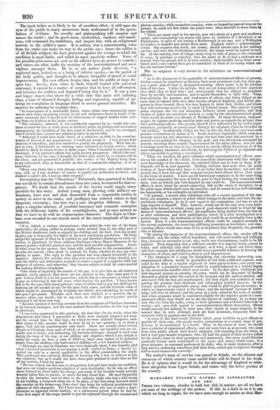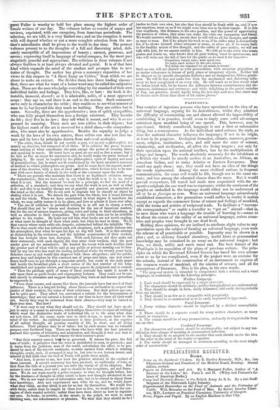MARGARET FULLER'S PAPERS ON LITERATURE AND ART. THESE two volumes,
slender in balk but rich in matter, are all we have yet seen of the writings of the author. If this be a fault in us it is one which we long to repair, for we have seen enough to assure us that Map-
garet Fuller is worthy to hold her place among the highest order of female writers of our day. The volumes before us consist of essays and
reviews, reprinted, with one exception, from American periodicals. The selection, we are told, is a very limited one; and on the reception it meets with will depend whether or not a more complete selection from the au- thor's miscellanies shall be given to the world in due time. The present .volumes present to us the thoughts of a full and discerning mind, deli- cately susceptible of all impressions of beauty ; earnest, generous, and serene; expressing itself in language of varied compass, for the most part singularly graceful and appropriate. The criticism in these volumes if not always faultless is at least always elevated and genial. It is of that best .kind which expands the mind of the student and prompts him to new trains of thought. The author has given a summary exposition of her views in this respect in "A Short Essay on Critics," from which we are about to make an extract. She divides them into three leading classes : first, there are what for want of a betterword may be called the subjective class. These are the men who judge everything by the standard of their own individual habits and feelings. They love, like, or hate : the book is de- testable, immoral, absurd ; or it is admirable, noble, of a most approved scope : they say so, and there is an end to the matter. Such comments serve only to characterize the critic ; they enable us to see what manner of man he is, but beyond this they teach us nothing. They are critics but in name. Secondly, there are the apprehensive ; men of quick sympathies, who can fully propel themselves into a foreign existence. They breathe its life ; they live in its law; they tell what it meant, and why it so ex- pressed its meaning. These men are true critics in their degree ; but the highest reach of the art is reserved for a third class,—the compreben- ,sive, who must also be apprehensive. Besides the capacity to judge a work by the laws of its own nature, these critics can also test that na- ture and its laws by principles drawn from universal analogies. " The critic, then, should be not merely a poet, not merely a philosopher, not merely an observer, but tempered of all three. If he criticize the poem, he must want nothing of what constitutes the poet, except the power of creating forms and speaking in music. He must have as good an eye and as fine a sense; but if he had as fine an organ for expression also, he would make the poem instead of judging it. He must be inspired by the philosopher's spirit of inquiry and need of generalization; but he must not be constrained by the hard, cemented masonry of method to which philosophers are prone. And he must have the organic acute- ness of the observer, with a love of ideal serfection, which forbids him to be con- tent with mere beauty of details in the work or the comment upon the work. " There are persons who maintain that there is no legitimate criticism except the reproductive; that we have only to say what the work is or is to us, never what it is not. But the moment we look for a principle, we feel the need of a criterion, of a standard; and then we say what the work is not, as well as what it is: and this is as healthy'though not as grateful and gracious an operation of the mind as the other. We do not seek to degrade but to classify an object by stating what it is not. We detach the part from the whole, lest it stand between us and the whole. When we have ascertained in what degree it manifests the whole, we may safely restore it to its place, and love or admire it there ever after. " The use of criticism in periodical writing is to sift not to stamp a work. Yet should they not be 'sieves and drainers for the use of luxurious readers,' but for the use of earnest inquirers, giving voice and being to their objections, as well as stimulus to their sympathies. But the critic must not be an infallible adviser to his reader. He must not tell him what books are not worth reading, or what must be thought of them when read; but what he read in them. Wo to that coterie where some critic sits despotic, entrenched behind the infallible 'We.' Wo to that oracle who has infused such soft sleepiness, such a gentle dulness into his atmosphere, that when he opes his lips no dog will bark. It is this attempt at dictatorship in the reviewers, and the indolent acquiescence of their readers, that has brought them into disrepute. With such fairness did they mite out their statements, with such dignity did they utter their verdicts, that the poor reader grew all too submissive. He learned his lesson with such docility, that the greater part of what will be said at any public or private meeting can be fore- lold by any one who has read the leading periodical works for twenty years back. Scholars sneer at and would fain dispense with them altogether; and the public, -grown lazy and helpless by this constant use of props and stays, can now scarce brace itself even to get through a magazine article, but reads in the daily paper laid beside the breakfast-plate a short notice of the last number of the long- established and popular review, and thereupon passes its judgment and is content.
" Then the partisan spirit of many of these journals has made it unsafe to rely upon them as guide-books and expurgatory indexes. They could not be con- .tent merely to stimulate and suggest thought; they have at last become powerless to supersede it.
"From these causes, and causes like these, the journals have lost much of their influence. There is a languid feeling about them,—an inclination to suspect the justice of their verdicts, the value of their criticisms. But their golden age can- not be quite past. They afford too convenient a vehicle for the transmission of knowledge; they are too natural a feature of our time to have done all their work yet. Surely they may be redeemed from their abuses,—they may be turned to their true uses. But how?
" It were easy to say what they should not do. They should not have an ob- ject to carry or a cause to advocate, whichobliges them either to reject all writings which wear the distinctive traits of individual life, or to file away what does not suit them, till the essay, made true to their design, is made false to the mind of the writer. An external consistency is thus produced, at the expense of all salient thought, all genuine emotion of life, in short, and all living influence. Their purpose may be of value: but by such means was no valuable _purpose ever furthered long. There are those who have with the best intention pursued this system of trimming and adaptation, and thought it well and best to
' Deceive their country for their country's good.'
"But their country cannot long be so governed. It misses the pure, the full tone of truth; it perceives that the voice is modulated to coax, to persuade; and it turns from the judicious man of the world, calculating the effect to be pro- duced by each of his smooth sentences, to some earnest voice which is uttering thoughts, crude, rash, ill-arranged it may be, but true to one human breast, and -uttered in full faith that the God of Troth will guide them aright. "And here, it seems to me, has been the greatest mistake in the conduct of these .journals. A smooth monotony has been attained, an uniformity of tone, so that from the title of a journal you can infer the tenons of all its chapters. But nature is ever various, ever new; and so should be her daughters, art and litera- ture. We do not want merely a polite response to what we thought before, but -by the freshness of thought in other minds to have new thought awakened in our own. We do not want stores of information only, but to be roused to digest these Into knowledge. Able and experienced men write for us, and we would know what they think, as they think it not for us but for themselves. We would live .with them, rather than be taught by them how to live; we would catch the con- tagion of their mental activity, rather than have them direct us how to regulate .'gown. In books, in reviews, in the senate, in the pulpit, we wish to meet ‘thinking men, not schoolmasters or pleaders. We wish that they should do fu 1 justice to their own view, but also that they should be frank with us, and, if now our superiors, treat us as if we might some time rise to be their equals. It is this tree manliness, this firmness in his own position, and this power of appretiating the position of others, that alone can make the critic our companion and friend. We would converse with him, secure that he will tell us all his thought, and speak as man to man. But if be adapts his work to us, if he stifles what is distinctively his, if he shows himself either arrogant or mean, or above all, if be wants faith in the healthy action of free thought, and the safety of pure motive, we will not talk with him, for we cannot confide in him. We will go to the critic who trusts genius and trusts us, who knows that all good writing must be spontaneous, and who will write out the bill of fare for the public as he read it for himself-
' Forgetting vulgar rules, with spirit tree To judge each author by his own intent, Nor think one standard for all minds is meant.'
Such an one will not disturb us with personalities, with sectarian prejudices, or an undue vehemence in favour of petty plans or temporary objects. Neither will he disgust us by smooth obsequious flatteries and an inexpressive, lifeless gentle- ness. He will be free and make free from the mechanical and distorting influ- ences we hear complained of on every side. He will teach us to love wisely what we before loved well, for he knows the difference between censoriousness and dis- cernment, infatuation and reverence; and while delighting iu the genial melodies of Pan, can perceive, should Apollo bring his lyre into auditnee, that there may be strains more divine than those of his native groves."



























 Previous page
Previous page